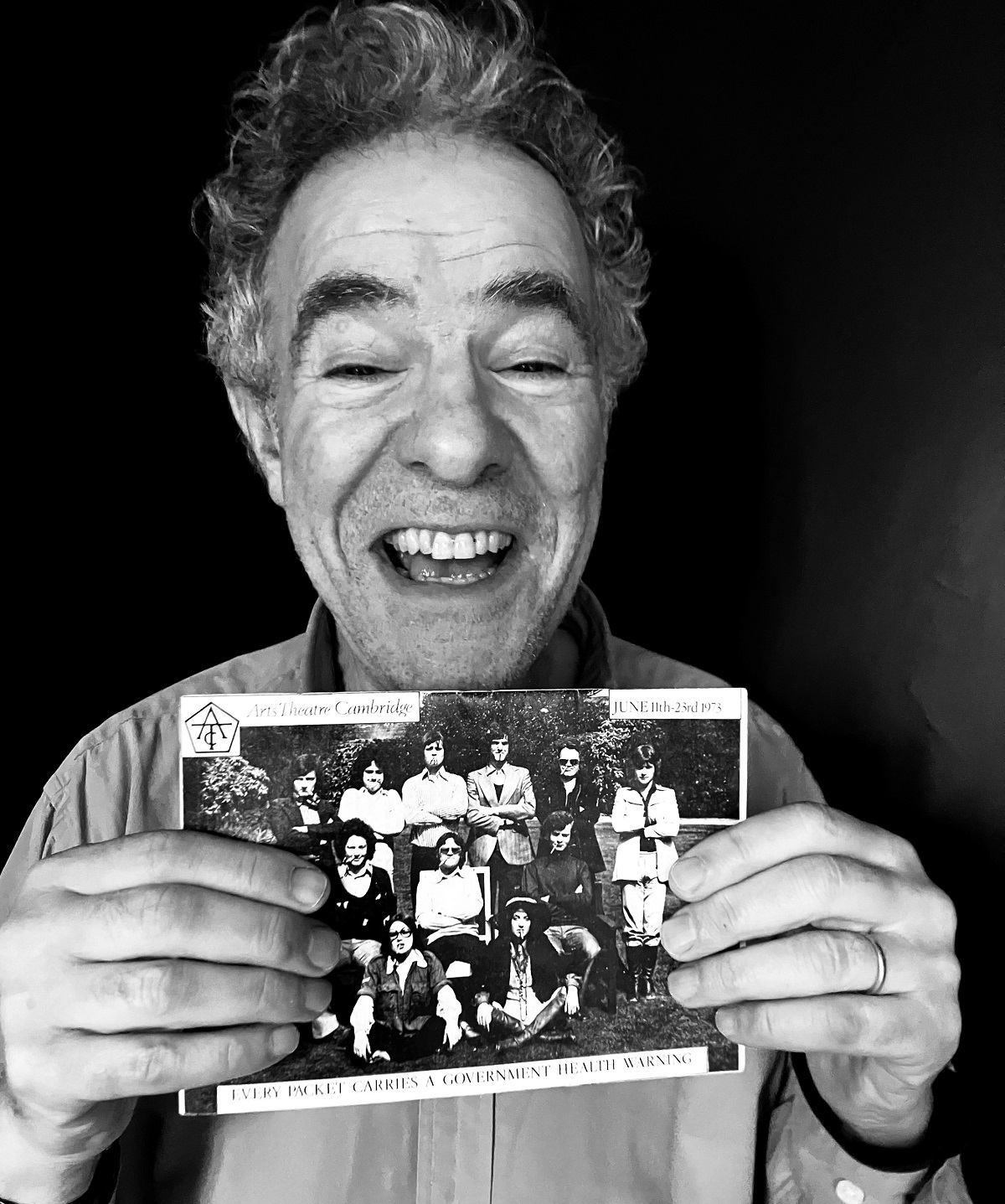Jon, pictured above with the 1973 Footlights programme. He says: "I’m third right in the back row (two along from Griff Rhys Jones)."
Jon Canter (Law 1971) is a well-established comedy writer who, over his decades-long career, has worked with household names including Lenny Henry, Dawn French, Mel Smith, Griff Rys Jones, Richard Wilson, Arabella Weir, and Stephen Fry and Hugh Laurie. Jon spoke to Caius Communications Assistant Chloe Applin about his work.
What is it like writing comedy which is delivered by others? Can you tell us about the collaborative process.
My collaboration with Lenny Henry went on for 30 years, so most of what I know about collaboration comes from working with him. Everyone says to me, ‘How could you collaborate with Lenny Henry? You’re not a black working-class guy from the Midlands.’ Quite. Nor am I a stand-up comedian. But those were my – albeit negative – qualifications for working with Lenny. I wasn’t like him, I wasn’t in competition with him, I could sit in the audience and watch him and take notes, without wanting to be him. I couldn’t be him, even if I wanted to.
Collaborating on stand-up is scary, because the comedian’s main collaborator is not you, it’s the audience. If the audience doesn’t laugh at your joke, it kills that joke, and the one after. Jack, you’re dead, and you’re dead twice.
The phrase that comes back to me more than any other is: ‘From the shop’. As in, ‘That joke is from the shop’. Lenny would do a riff about his childhood, say, and he’d ask me to shape it and add jokes, and then he’d perform it in front of me, just the two of us in a room, and often he’d say, that’s a perfectly good joke, but it doesn’t sound like my joke. It sounds like a generic joke about childhood anyone could say. A generic childhood joke you could buy from a joke shop, filed under C for childhood.
So, if you’re writing for someone, you have to make sure you’re tailoring what you do to their voice and their personality. That’s the job. I spent 30 years, on and off, sitting in a house in coastal Suffolk, pretending to be Lenny Henry. How many people can say that? Of course, you could say, shouldn’t you have been pretending to be you?
I understand you once lived with Douglas Adams author of 'The Hitchhiker’s Guide to the Galaxy'. What was that like?
Douglas and I shared flats for five years, so my memories of him are intensely 20-something and flatmatey. Like the fact that he spent hours and hours thinking in the bath, and there was only one, so don’t mind me, I'll stand naked in the rain if I want to get clean. And then there are the musical memories: Douglas writing Hitchhiker to the sound of Kate Bush’s 1978 classic Wuthering Heights, played over and over and over again, to the point where I felt so wuthered I could cry.
What sort of comedy did you enjoy when you were growing up?
My dad took me to the Everyman Cinema in Hampstead to see Marx Brothers films when I was eight or nine. I found their anarchy and verbal aggression intoxicating. Then, when I was 13 or so, I developed a huge comedic crush on Peter Cook. He was so enigmatic and deadpan and beguiling and unnervingly funny. And then came Monty Python. Every Palin performance was brilliant, and every Cleese performance so tightly wound you feared he might explode. The Argument Sketch is the one to save from a burning building.
Are there any emerging comedians you particularly like today?
I went to the Edinburgh Festival in 2022 and saw 73 shows. (Admittedly, I saw my own play 20 times, so that skews it.) I don’t know whether they’d thank me for calling them ‘emerging’, but four comedians stood out: Luke Rollason, Sofie Hagen, Jess Fostekew and Anna Mann – the genius creation of Colin Hoult.
If you had to describe your comedy language in three words, what would they be?
Droll, ironic, concise. But I wish I’d been more fearless.
I understand you were president of Footlights in what looks to have been a Golden Age. How do you remember those days?
Emma Thompson, Stephen Fry, Hugh Laurie and Tony Slattery appeared just a few years later – they were the Golden Age. With due respect to my contemporaries, I think we were a Bronze Age. But Bronze is not so bad. At least we podiumed.
I’m simultaneously proud and appalled that the funniest thing I ever wrote, I wrote for a Footlights sketch. My friend Paul Thimont (Law 1971) gave me a humongously large tie for my birthday. The tie was so large that it reached below my waist and fanned out to cover my naughty bits (copyright Monty Python). So, I wrote a sketch about three men entering a restaurant. The first two, respectably dressed in a jacket and open-necked shirt, are ejected by the Head Waiter for not wearing a tie. Then I shuffle onstage – sideways – naked but for the aforementioned tie. And the Head Waiter greets me with the words: ‘Good evening, Sir. Your usual table?’
The thing is, what I learned writing the Tie Quickie was not helpful in the construction of 30-minute scripts. You can’t create a 30-minute script out of 50 quickie jokes. The scriptwriting language of ‘inciting incidents’, ‘emotional beats’, ‘A-plots’ and ‘B-plots’ had to be learned.
What pieces of advice could you give to comedians and writers starting out today?
I like what Lenny Henry says about comedy, which is: ‘It’s all about them’, meaning it’s all about your audience. So, I’d advise you to remember that your work is not about how you feel, it’s about how you make your audience feel. It’s not therapy or autobiography, it’s the search for an audience response.


